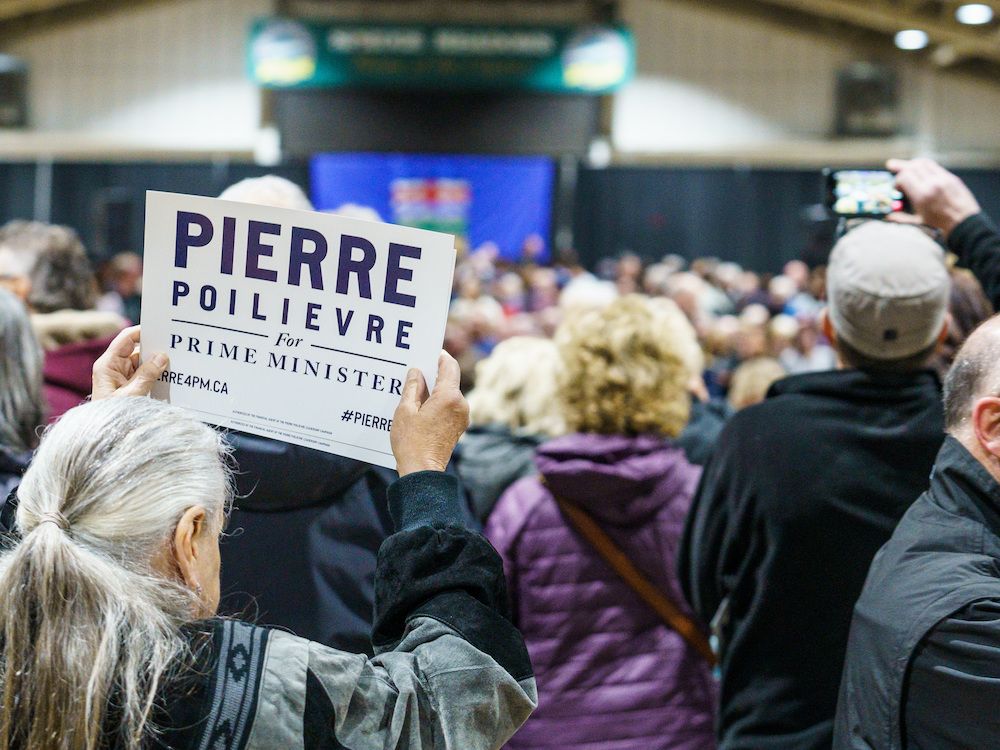There’s been a lot of panic over the “P” word lately. Yes, Pierre Poilievre, but more specifically, populism. The term is being weaponized to villainize candidates who oppose the elite status quo, often implying they have devious ulterior motives, anti-democratic leanings and racist views.
Accusations like these are a decades-old tactic of anti-populists and those who want to see them fail. The truth is there’s nothing inherently bad about populism — although, like all political ideologies, it can be co-opted by conmen (or women) and aspiring authoritarians.
There were certainly populist elements to Donald Trump’s campaign, but he is not a true populist, even if it is convenient for anti-populists to paint him as one. Calling Trump a populist, however, allows fearmongerers to undermine populist movements and politicians without actually having to provide proof for all the “isms” they imply.
Take, for example, Poilievre. When elites and opponents warn he’s a populist leader, they hope voters will also hear “nativist,” “racist,” and “fascist” when there’s no evidence to back any of this –– and certainly none more damning than photos of our current prime minister sporting blackface.
There’s been a lot of panic over the “P” word lately. Yes, Pierre Poilievre, but more specifically, populism. The term is being weaponized to villainize candidates …

nationalpost.com
They seek to equate Poilievre with Trump, which, if you take a minute to think about it, makes little sense beyond his ability to draw crowds and utilize populist messaging. Painting all politicians who tap into populism with the same brush is like saying all startup owners are fraudster criminals because, like Theranos’ Elizabeth Holmes, they use tech jargon and aim to attract investors.
Trump was unapologetically anti-illegal immigration. Poilievre wants to fast-track immigrant applications and make it easier to transfer their credentials. Trump was seen as uninterested in how government worked. Even Poilievre’s staunchest opponents begrudgingly admit the man does his homework. Trump sought to subvert democratic norms to retain power. Poilievre has indicated nothing of the sort. The comparisons simply don’t hold muster.
The irony is populist ideas, largely from the early 20th century, are responsible for many of the economic and political norms we take for granted today. These include labour rights, public ownership of vital infrastructure, income taxes and even fiat currency.
It was the populist “Free Silver” movement of the late 1800s and early 1900s that led the charge to move away from a gold standard that heavily indebted farmers and workers. There’s an interesting echo of this in Poilievre’s controversial embrace of crypto currency.
Franklin Delano Roosevelt was a populist leader, and his New Deal was especially populist. While he’s largely celebrated now, at the time FDR was portrayed as a dangerous demagogue. The mainstream media hated him, which led him to broadcast fireside chats. A group of Wall Street bankers went so far as to plot a coup.
While it may seem counterintuitive, Poilievre’s populist tendencies have more in common with FDR or Alexandria Ocasio-Cortez than they do a politician like Trump. Poilievre and AOC even fall into the same traps of showmanship over substance: AOC with her “Tax The Rich” dress at the MET Gala and Poilievre’s occasionally over-the-top videos and question period performances.
This brings up another important point: populism isn’t even inherently right wing. There’s a concerted effort to tie dangerous far-right politics to populism, but it exists on both sides of the spectrum. In the U.S., there are populist leaders (and those who seek to capitalize on populism for their own gain) on both the right and left.
Canada’s left has largely abandoned populism since Jagmeet Singh became NDP leader. This, too, helps explain the willingness of non-Conservatives and even non-voters to support Poilievre –– there’s simply no populist alternative. He attracts supporters who identify less with a party or place on the political spectrum than they do as against the elites and status quo.
Of course, one can still debate Poilievre’s ideas and there will be many who don’t agree with him for legitimate reasons. Just as being a populist doesn’t mean a politician is inherently bad, neither does it automatically mean they’re a good solution for society’s ills. Using “populist” as a pejorative to dismiss Poilievre is nothing more than an elitist scare tactic meant to appeal to the very fear and hate gatekeepers accuse him of propagating.
Make no mistake; populism is a threat, but not to democracy. It’s a threat to those who benefit from existing economic and political systems, often at the expense of average Canadians. We’ve been told to be skeptical of populists, but it’s anti-populists we should be more worried about.

www.facebook.com
